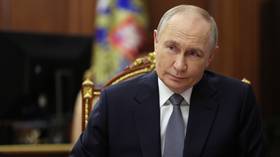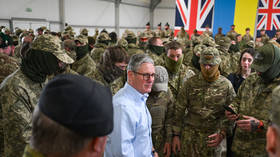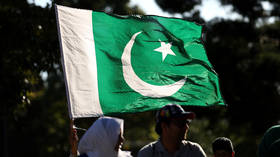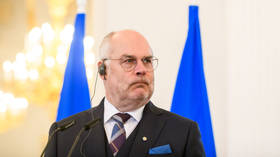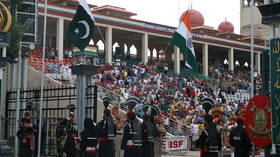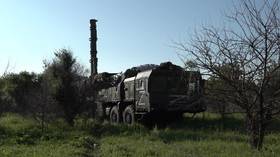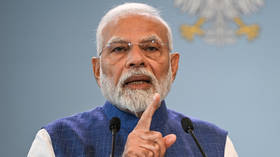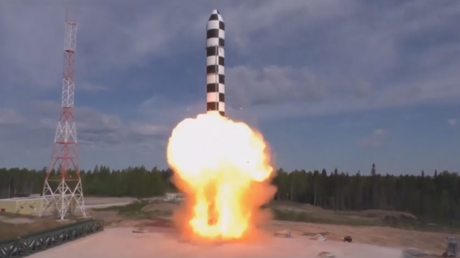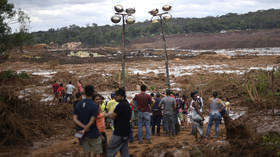US seeks to protect hegemony by leaving INF Treaty but will only put itself in peril – experts
Washington is about to leave the INF Treaty, a landmark accord that arguably averted a nuclear conflict in Europe during the Cold War. The US is now scrapping it to assert global hegemony, experts told RT.
Signed by US President Ronald Reagan and Soviet leader Mikhail Gorbachev in 1987, the Intermediate-Range Nuclear Forces (INF) Treaty banned all land-based nuclear-capable missiles with a range between 500 km and 5,500 km. Hundreds of such missiles, including those armed with nuclear warheads, were deployed across Europe by both the US and the USSR at the time. This put the world on a brink of accidental annihilation, since the arrival time of such a missile amounted to between mere five and seven minutes and left virtually no time to verify a suspected launch before retaliating.
Arms Race 2.0? US production of nuclear warhead starts days before INF withdrawal pic.twitter.com/423sdNixCn
— RT (@RT_com) January 30, 2019
Washington is about to scrap this key nuclear reduction agreement, with US officials expected to formally announce unilateral withdrawal on Saturday, claiming that Russia is not complying with it anyway and that the INF no longer makes sense in modern world.
The treaty indeed applies only to the US and Russia, while many more countries – including China, Iran and Israel – have missiles banned by the INF in their arsenals. Washington insists it needs to have similar capability to pursue its goals. Some US allies in the West tend to agree that the “arms control and disarmament policies” need to be rethought since the current rules are “outdated,” as the German Foreign Minister Heiko Maas put it.
Also on rt.com German foreign minister to discuss INF missile treaty during Washington visitRussia has also long admitted that the accord has its flaws – for instance, allowing the US to circumvent its terms. Back in 2007, Russian Defense Minister Sergey Ivanov criticized the INF and even suggested leaving it. But Moscow eventually came to a conclusion that the agreement should not be dismantled but rather amended, potentially including more member states. The US is apparently reluctant to consider such an option.
RT talked to experts to find out what lurks behind the US decision to leave the treaty as well as what consequences such decision might have.
Protecting ‘crumbling’ global hegemony
Accusations against Moscow that Washington cited as the reason for its decision are nothing but a mere pretext for a move that in fact serves the US geopolitical and economic agenda, experts told RT.
Also on rt.com Russia warns US against arms race on Earth & space after missile defense plans revealed“The US uses [Russia] as a pretext to withdraw from the agreement and keep its face,” said Ivan Konovalov, director of the Center for Strategic Environment think tank, adding that the Americans “just do not need it.” The treaty interferes with their policies and throws obstacles in the path of the American military industrial complex, which is so “cherished” by President Donald Trump, he argued.
“The US does not want Russia and China to turn into the new centers of power as it threatens Washington’s global hegemony, which is already crumbling,” Konovalov said.
Nothing US does will change Russia's approach to INF Treaty issue - deputy FMhttps://t.co/TUWe12cQLd
— RT (@RT_com) January 27, 2019
The US particularly wants to continue the military build-up on the Russian borders to raise the stakes in its “power game” against Russia, said Igor Korotchenko, editor-in-chief of the National Defense journal and member of the Russian Defense Ministry’s public council.
China, which currently possesses the largest arsenal of intermediate range missiles, is Washington’s other major target. The US seeks to stop Beijing’s advancements in the South China Sea as it fears to lose control over the Asia-Pacific region, Viktor Murakhovsky, editor-in-chief of the Fatherland’s Arsenal journal, told RT.
Gaining nothing but trouble
However, in its apparent bid to outplay its rivals with sheer force and power play, Washington is more likely to put itself and its allies at risk rather than achieve its goals, the experts believe. US withdrawal from the INF would most likely just throw the world back to the times of the Cold War.
If the US were to deploy nuclear-capable missiles to Europe after scrapping the treaty, it would literally put the host nations at a gunpoint – as the missile sites would become targets of Russian high-precision weapons, Konovalov said.
Also on rt.com ‘Prepared to counter any threat’: Russia’s top 10 military events of 2018“The US is simply putting Europe under fire,” Lieutenant-General Aytech Bizhev, former deputy head of the Russian Air Force, told RT, adding that Washington is unlikely to win anything from such a decision. Bizhev also argued that the military advantage of such a deployment would be dubious in modern times, because it would be difficult to use them for a decapitating preemptive strike.
“No move can be made all of a sudden. It is just impossible to hide … preparations for an aggression due to a number of factors,” Bizhev said. The US might face a retaliatory strike even before it makes its move.
Also on rt.com From hypersonic glider to nuke subs: Meet Russian arms on brink of deployment (PHOTO, VIDEO)With the INF scrapped, Russia will not hesitate to build its own arsenal as needed for its national security, the experts warned.
“In two or three years, Russia will have its own [arsenal of] intermediate-range missiles,” Murakhovsky said. Moscow already has all the needed technologies and needs only to “take a political decision” to start production, Korotchenko pointed out.
If you like this story, share it with a friend!



